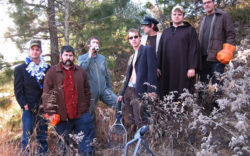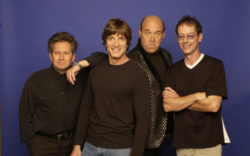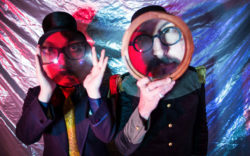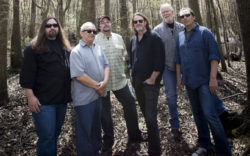It’s been nearly 20 years since Jucifer first started creating thunderous rock sounds in Athens. (The group has since famously adopted a nomadic lifestyle, living and touring out of its trusty RV.) Drummer Ed Livengood and guitarist/vocalist Amber Valentine began playing together under the name, a play on both O.J. Simpson and Satan, in 1994. Rehearsing in their home on Childs Street, just off of Prince Avenue, they quickly developed a signature style: high-volume, downtuned, angst-fueled grunge-metal.
At Jucifer’s earliest shows, Livengood battered his rickety drum kit with impressive muscularity and flare. Playing through stacks of various amplifiers, Valentine created a distorted wall-of-guitar sound that enveloped the bass and mid-range frequencies. Tempos fluctuated; one song might be upbeat and almost poppy, while the next was a gruesome dirge that used repetition, space and dissonance to a sludgy effect.
“I think we’ve always been the same band we are today, which is one with few limits and many pleasures within the world of sound,” says Valentine. “Depending on which set or song or album somebody catches, it could seem like we change a lot, since we’re diverse in our choices. But that diversity isn’t a progression from or rejection of something else we do or did. It’s simply that in any given moment, we’re choosing a part of ourselves to reveal or revel in. It’s all about expression, and not at all about definition for us.”
The band’s earliest recordings rocked hard, but Valentine’s singing style could swing easily from angelic to demonic, whisper to scream, creating a dual personality. In the early and mid-2000s, while signed to metal mainstay Relapse, Jucifer cranked up its metallic, head-banging side for a more aggressive, menacing sound.
“If anything has changed since we started, it’s that people have had time to understand how we approach things,” Valentine says. “Realizing we’re a band that follows its own path to any crazy-ass place—not attempting to define us too narrowly. And that’s nice. Also, we’re older, and hence more muscular from the cumulative effects of hauling gear around.”
Valentine and Livengood veered sharply into new conceptual territory with their latest collection, the Russian-themed за волгой Ð´Ð»Ñ Ð½Ð°Ñ Ð·ÐµÐ¼Ð»Ð¸ нет (which translates to Beyond the Volga There Is No Land), the long-awaited follow-up to 2010’s Throned in Blood. Released last summer on the Nomadic Fortress/Mutants of the Monster imprints, the songs center thematically around the Battle of Stalingrad, and the titles and sleeve info are written entirely in Russian.
Jucifer started working on the album in Ontario, Canada in 2011 with producer Joe Byrne at the helm. Within a few weeks of the initial sessions, the duo embarked on its first tour through Russia.
“We certainly did [the album] with a fresh infusion of Russian experiences,” Valentine says. “Although we haven’t had trouble [in the past] feeling deeply for subjects set in places we’ve never been, it was cool to have sense memories still tingling” during the construction of the record.
The Russian theme had established itself by the time the band returned to the country to tour the following year. “Playing Volgograd in 2012 solved our question as to how we were going to record Russian narration for the record,” Valentine says. “The promoter for our shows there, Oleg Kotrunov, and his family did us the huge favor of contributing. Oleg recorded, and his wife Larisa translated our text to Russian while retaining its rhythm and flow, and voiced [opening track] ‘The Land Speaks.’ Their children, Vladimir and Maria, each contributed speaking parts, and Masha sang a traditional patriotic song of the city. It was beyond special to return in 2013 and present the album to them. Their parts were integral to creating the authentic ambiance we wanted.”
Some tracks on за волгой Ð´Ð»Ñ Ð½Ð°Ñ Ð·ÐµÐ¼Ð»Ð¸ нет resemble classic Jucifer, with Valentine’s six-string blasting through her teetering stack and Livengood’s oversized drums and cymbals rumbling and crashing underneath. But sometimes it sounds like an alien war machine gone haywire. Experimentation has been essential to every Jucifer studio session, and the band wanted to pair a decidedly different sound with its newest album’s ambitious theme. Compared to the group’s 1998 studio debut, Calling All Cars On the Vegas Strip, it’s a very different kind of heavy-rock album.
“With all our albums, we’ve tried to impart a sense of place and/or time,” Valentine says. “With language, with production style, instrumentation, everything. It’s totally cool with us if a majority of listeners don’t care to look so deeply, but for us, each concept is something we leave trails and clues about within not only the lyrics and artwork, but every single dynamic of each song. So, the Russian language is a very specific tool we’re using to immerse the listener, lull them and frighten them.”
There’s plenty of doom and gloom at the heart of за волгой Ð´Ð»Ñ Ð½Ð°Ñ Ð·ÐµÐ¼Ð»Ð¸ нет, but there are more than a few surprisingly beautiful twists as well. There’s a groove to “БоритеÑÑŒ, чтобы жить Ñвободно” (“Fight Hard, Live Free”) that counters the devilish snarl of Valentine’s singing. “ПОЗОР” (“Shame”) features a swingin’ monster riff. “Королева—оленьи рожки” (“Queen of Antlers”) lumbers and slinks at a painfully slow pace.
“It’s too soon for us to get the full effect of a record until at least 10 years have passed,” Valentine says. “Until then, we’re still hearing flaws or could-have-beens—or at the very least, knowing the sequence instead of being surprised by it the way somebody is on a first listen.”
While things seem pretty scary and bleak on much of the album, there is an underlying message that’s more positive or optimistic than some listeners might assume.
“The happy ending is that Volgograd endures, that no one forgets, but that no one stays trapped in the past, either,” Valentine says. “Humanity suffers but rebuilds, time after time. And we never seem able to eradicate the sources of human suffering and human evil, but there are periods in which we can rest and enjoy life.
“Also, those who died defending their home literally helped save the world,” she adds. “There’s solace and legitimate pride to be had in that.”
WHO: Jucifer, Hot Breath, Manger
WHERE: Caledonia Lounge
WHEN: Thursday, Feb. 6, 9 p.m.
HOW MUCH: $7 (21+), $9 (18–20)
Like what you just read? Support Flagpole by making a donation today. Every dollar you give helps fund our ongoing mission to provide Athens with quality, independent journalism.










